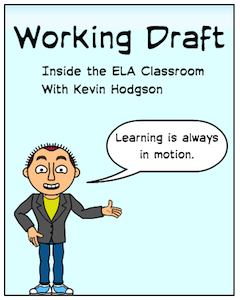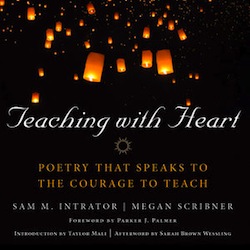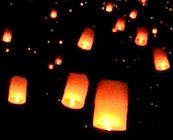Poems To Sustain Our Teaching Hearts

I know my kids are getting antsy, not only with summer vacation coming, but also with the huge transition in their lives when they leave our elementary school setting, where they have been for seven or eight years, and move into the middle school/high school setting for the next six years. I see regression in behavior.
Small things that we stamped out months ago (a touching/tag game) come blooming back. There’s that group of boys who returned to school after spring break, openly declaring “I’m done for the year.” There’s the slouch of shoulders, and the nearly audible sigh of “this is boring” every time we start something new. There’s the raft of emails sent off to parents, trying to engage them as my partner to rein things back in.
I’m exhausted, and there’s still three weeks to go.

This is the third collection put out by editors Sam Intrator and Megan Scribner in which educators are invited to share poems that shape them as teachers. These are the poems we keep by the nightstand or framed on our desk, literally or figuratively. The 250-word essays, paired up with the poems, are like lifelines.
Grappling with words
I flip through the book, finding a piece by high school teacher Emily Brisse, who points us to the poem “The Writer” by Richard Wilbur, as she brings us into her classroom and her own realization that her students “…each of them, who — underneath their baggy clothes and eyeliner — are grappling with words as old as earth, and getting them right.”
There’s Kathleen Melville, who begins her essay with a line that resonates with me: “I feel guilty,” and then goes on to share out Mary Oliver’s poem, “Wild Geese,” with the lines: “Whoever you are, no matter how lonely/the world offers itself to your imagination/ calls to you like the wild geese, harsh and exciting.”
There’s Jose Vilson, middle school math teacher, bringing us into his own difficult childhood, as he relates to his students now with echoes of Tupak Shakur’s “The Rose That Grew From Concrete” as poetic soundtrack to his days. And middle school teacher Melissa Madenki shares out John Daniel’s “A Prayer Among Friends,” noting that the poem “makes me feel part of a tribe, of something larger.”

What Teachers Make
Which brings me to my own submission in Teaching With Heart.
Like many other contributors, I considered the editors’ advice to search for a poem that I come back to time and again, and to consider the story of that poem and its impact on my teaching life. I chose Taylor Mali’s “What Teachers Make,” a powerful spoken poem that confronts the question of why one would want to teach head-on in a style and bluster that only Mali can muster.
There are times when I need Mali’s muse on my shoulder, when I need his anger and bite, and his final remark that teachers “make a difference” is a critical understanding of why I work so hard to connect with my students, day in and day out, just like you.
I invite you to post a comment here. What’s your poem? Whose words do you keep close to you and why? Join the conversation.
ALSO SEE AT MIDDLEWEB: Courageous Hearts: Teachers Write About Their Work, by Sam Intrator and Megan Scribner.


































Thank you for your post, Kevin, and for sharing Taylor Mali’s video.
Several years ago, I wrote this poem for a cohort of preservice K-8 classroom teachers – to affirm the worth of their chosen profession and to help prepare them for the sweet sorrow of the “so long” at the end of a school year.
they come and they go
pristine boxes of crayons with perfect points
proud, unsharpened pencils and unblemished erasers
in their warm, sweaty, hopeful hands
they come;
the children appear at our door.
we open to their fresh faces, eager minds
anxious to hear their stories and tell them ours.
odd that we begin at harvest
when the Earth readies itself for the fallow time.
we dig and plow and plant our gardens.
we tell and read stories and adventure together;
we write poems and make memories together.
we organize and rebuild the worlds we know
and construct new worlds that could exist
if only in our imaginations.
we celebrate
the changing seasons of our minds.
we celebrate
the changing shapes of our bodies
and the light that enters our room at different angles.
we bury our hands and heads in stuff,
in ideas and possibilities;
and we make a mess and clean it up
and make a mess and clean it up
and make a mess all over again.
then all of a sudden, spring burns hot
and the last day comes with the promise
of freedom, of unplanned time
that draws us out the door of this
hallowed space
where we came together
where we could not remain forever.
we hug and wave goodbye and
they go
with stubby pencils in their warm, sweaty, larger hands.
and not even the hollow emptiness of this room
not even all of the plans left undone
not even this breaking in our hearts
can keep us from doing it all over again
next year.
©2006 Judi Moreillon
Judi
Thank you, for sharing that poem. It captures so much of the pull and push of the year.
I loved these lines:
they come and they go
pristine boxes of crayons with perfect points
proud, unsharpened pencils and unblemished erasers
in their warm, sweaty, hopeful hands
they come;
the children appear at our door.
Nicely done!
Kevin
Judi
I hope you don’t mind, but I took your poem and “remixed” it for an online collaboration of teachers. Our theme was remix, and your poetic words have stuck with me.
This remix honors you as the poet, I hope.
https://notegraphy.com/dogtrax/note/983501
Kevin
Judi –
I love your poem. I love the last three stanzas at this time of year – I enjoyed THEM, but it is time for them to go; I ALSO look forward to that freedom and unplanned time. But, like you, I look forward to (the first two stanzas – or three if you count your one liner opening – which may be your title), meeting a new group in a new year. Something to look forward to, for both students and teachers, is necessary.
Thank you for sharing.
Rhonda